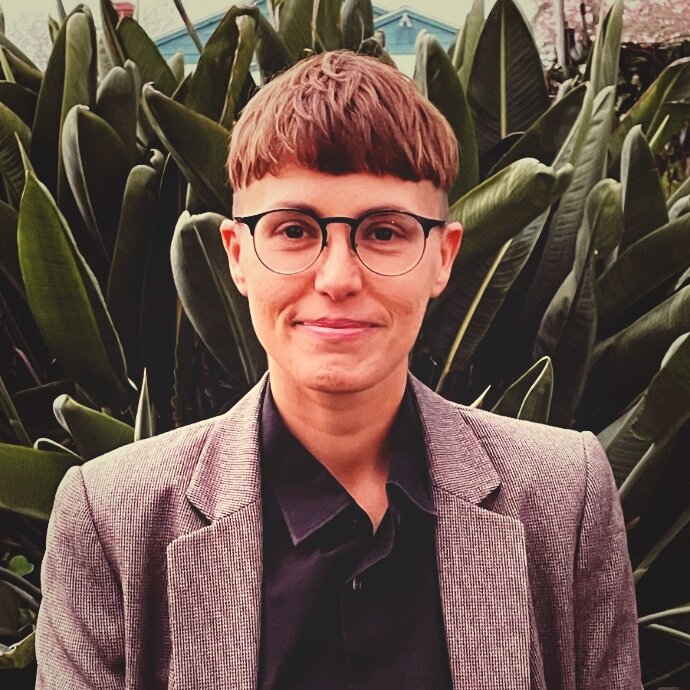Trans-led counselling fights to save lives and provide ‘chosen family’ amid anti-LGBTQ+ hate

Trans-led peer counselling by TACT helped Beth discover “little nuggets” about their experience. TACT’s director AJ Schaerer was inspired to do the work by their experience transitioning. (Supplied/Getty/PinkNews)
Finding the right person to talk to about being trans, and the impact of hate on mental health, can seem like hard work.
And for Beth, the “beauty of getting support” from trans-led peer counselling helped them discover “little nuggets” about their identity and experience.
Many transgender and non-binary people grapple with some aspect of their identity, whether that’s struggling with gender dysphoria, isolation or bigoted attacks against the community.
Sharing common ground can alleviate some of the fear and anxiety of speaking to a stranger about mental health, which is why the trans peer counselling at TACT (Trans Advocacy and Care Team) is so powerful.
TACT offers free counselling and support groups for gender-diverse people across the US. Volunteer counsellors support other transgender people as they navigate their gender journey and help access the affirming resources that are best for them.
Beth has participated in this one-on-one counselling with a TACT volunteer counsellor, called a Gender Advocate, for a little more than a year, since realising they are non-binary and trans.
Coming out as non-binary and trans at the age of 30 left them with questions about connecting with the queer community, figuring out their sexuality and working through “what it feels like to lose someone” after a break-up.
“I was married to a cis man for seven years and figured this out amid our marriage, which has since ended in divorce,” Beth tells PinkNews.
“[I’ve] worked through that with [a Gender Advocate]: what it feels like to lose someone who you’ve been with for more than a decade, and choose myself through all of that, because it can be easy to search for safety in things that are known instead of embracing my identity and what will truly make me happy.”

Having been in therapy before, Beth goes on to say: “It’s kind of an emotional experience to have space held by someone who shares pieces of identity, understands the processes you’ve been through. It’s so different from just a random human who has the normative, general things in common with you.
“I was experiencing, and still do sometimes, feeling not trans enough, because I’m very genderfluid. I’m not trans masc.
“A lot of the time, I came in kind of confessing that, and [my Gender Advocate] guided me into not needing to be in a particular box. It’s a work in progress, but being with someone who can continue to validate my non-linear process, my fluidity, and be in that confusion with me, but also help me find clarity in between places, is invaluable.”
There is plenty of evidence that being trans in a hostile society can contribute to poor mental health
Trans people endure terrible discrimination and have seen politicians repeatedly use the community as a target. A disproportionate number of transgender people experience depression, anxiety and suicidal thoughts.
Studies show gender-affirming care, encompassing a range of social, psychological and medical interventions designed for trans people, improves mental health and quality of life, and has been shown to reduce the risk of suicide.
Schaerer believes the rising tide of anti-trans rhetoric in the media and politics takes a huge psychological toll on trans people.
TACT’s peer counselling seeks to flip the “victim narrative for trans folks” – perpetuated by the media – on its head because that “does not have to be the reality” for members of the community.
“Trans folks can live joyfully and authentically if they’re celebrated, have a community that welcomes them with open arms and a place where they belong,” Schaerer says.
It’s “empowering” to take part in peer-to-peer counselling because there’s “beauty” in helping other trans people, they say. In doing that for someone else, “You’re reaching out to the parts of yourself that have felt that similar pain and joy.

“My transition was one of the things that originally inspired me to do this work, and something that stands out for me is this memory of finally realising who I was. There were things that were scary and hard about it,” Schaerer admits.
“But, for the most part, I was feeling joy and excitement about coming into myself. There was this reaction [to coming out] that was common: ‘Oh my gosh, I’m so sorry. That’s going to be so hard for you’, like you’re being diagnosed with a terminal illness or something.
“That’s not the way it needs to be. Trans people are courageous and can reject the gender norms that so many folks are oppressed and constricted by. There’s so much joy and expansiveness in being trans, non-binary and gender-expansive.
“Being able to recognise that myself, as part of this process, and connect with other folks, helping them find joy, I feel those individuals so often teach me to see and celebrate things about my gender expansiveness, and my journey, on a daily basis.”
Schaerer explains that trans-led peer counselling is about being a “supportive network, part of that chosen family” who can help other members of the community find “that sense of belonging and safety”.
How did this story make you feel?

